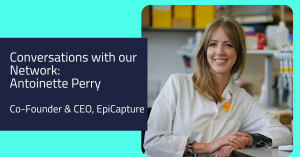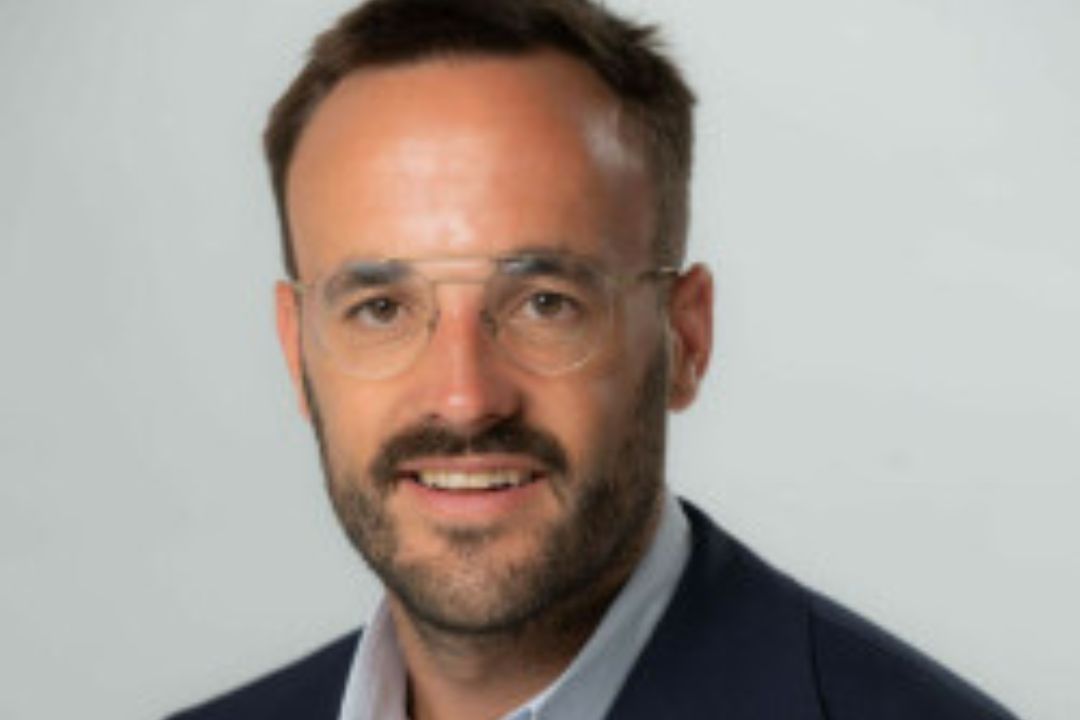30th August 2022
In our latest instalment of the Conversations with our Network series we were lucky to catch up with a finalist in this year’s Wild Card competition. CEO and Co-Founder at EpiCapture, Antoinette Perry, told us about her passion for developing patient-centred solutions that can have maximum impact for patients and the innovation behind EpiCapture.
Associate Professor Antoinette Perry is the Head of Cell and Molecular Biology at University College Dublin (UCD), where she leads a research team focusing on translational cancer epigenetics – understanding the role of epigenomic aberrations in the pathogenesis of cancer and harnessing these aberrations to develop prognostic and predictive biomarkers.
We were inspired by her idea for a simple urine test for early detection of prostate cancer. This has potential to transform healthcare, not only for patient experience, but to generate cost-savings for providers which could be re-invested into future live-saving technologies. It is no wonder her and Co-Founder Edward Simons wowed the Wild Card judges.
Meet Research Scientist, innovator, human, dog mom, and the CEO of EpiCapture Limited, Antoinette Perry:

Tell us about your background in cancer research
I’ve been working in the field of cancer epigenetics for 20 years, and developing the idea behind EpiCapture for a similar amount of time.
In 2002, I was awarded a postgraduate scholarship from the Irish Research Council and earned my PhD studying the epigenetics of prostate cancer. During this period, I carried out several international mobility elements at the National Cancer Institute in Bethesda, USA, which greatly accelerated my research.
The focus of my early work was trying to find changes in DNA that could differentiate aggressive prostate cancer from lower risk forms. In 2009, I was awarded a postdoctoral fellowship from the Irish Cancer Society to further develop my research in prostate cancer biomarkers.
About 10 years ago the Movember Foundation launched and funded a number of cross-regional collaborative Global Action Plans. I was invited to join the GAP1 urine biomarker project as a funded investigator. Around the same time I was awarded a young investigator award from the US Prostate Cancer Foundation. These programmes were hugely important to enable us generate proof of concept that we could detect the biomarkers for aggressive prostate cancer in urine.
Urine is the least invasive liquid to obtain so liquid biopsy research has become a hot topic in recent years. We were able to identify 85% of aggressive prostate cancers in a cohort of 453 men that were recruited into the Movember GAP1 Urine Biomarker study using our EpiCapture combination of biomarkers.
I have been working with UCD since 2015, currently in the role of Associate Professor and leading a team of seven PhD students and two research assistants. My research passion is epigenetic biomarkers for early cancer detection, and I aim to demonstrate real world relevance of my research. Research work has started on a test for ovarian cancer, however EpiCapture-prostate is the first of my projects to transition towards commercialisation. Edward Simons is my Co-Founder and we’ve been working together for two years.
What problem does EpiCapture aim to solve?
Having spent time with prostate cancer patients, it became clear that many have an aversion to biopsies which they find to be too invasive. There’s also an issue that needle biopsies can miss tumour and on the flip side that a large proportion of biopsies are negative, because they were never needed in the first place. What’s needed is an accurate and non-invasive test to triage men and identify those who need a biopsy to diagnose their disease. We aim to revolutionise the patient experience by sparing the majority of men the trauma of an invasive trans-rectal needle biopsy to rule out prostate cancer.
EpiCapture, a UCD spin-out supported by NovaUCD, offers a simple, painless and accurate test to detect aggressive prostate cancer. Rather than being sent for a biopsy, patients can be screened through a simple, non-invasive urine test that measures six epigenetic DNA biomarkers that are indicative of aggressive disease.
Clinical features, such as a patient’s age and family history are combined with the epigenetic data using a proprietary algorithm to generate an “EpiCapture score” that indicates the likelihood of having aggressive prostate cancer. The urine sample is run on PCR platforms so our timing is good as there is a lot of “platform latency” out there as demand for COVID tests has fallen.
Since our initial publication in 2019, we have been working to validate these findings in an independent cohort. Funded by Science Foundation Ireland and Enterprise Ireland, we were able to detect 90% aggressive prostate cancers with the EpiCapture test. The details of this study are currently being prepared for publication.
What sparked your interest in EIT Health’s Wild Card competition?
The Wild Card challenge for 2022 was focused on the early detection of cancer, including prostate, so it seemed like a perfect fit for EpiCapture. Wild Card gives us access to mentors with experience in IVD development and commercialisation in a global context. We have gotten a lot of out of the mentorship aspect of the programme so far, being paired with mentors who want to see steady progression from us.
As we enter the final stages of the competition, we see this as an opportunity to build and strengthen our business model and get to “investor-ready” status. It’s also great to be in the running for the €1.5m prize but we’re up against very strong competition!
Can you tell us about your experience so far on the programme?
It’s a competitive process to get onto Wild Card so we were delighted to get selected and spend four days in sunny Vienna. 54 people from across Europe working on early detection of cancer or mental health projects. We found Wild Card’s workshops on team building and effective communication really beneficial.
A week later, the Deep Dive mentorship phase started which was run remotely. It was an intensive week during which we had 12 sessions with 10 carefully selected Europe and US-based mentors, which mirrors our target markets, who had a technical or commercial background. The quality of the sessions grew as mentors developed an understanding of what EpiCapture is about. The mentors were engaged and we ended up having really valuable two-way discussions on issues raised by the mentors and by us.
The week finished with teams pitching to mentors who decided which teams progressed to the final phase of the process.
Antoinette and Edward returned to the Wild Card programme last week. As they embark on an 8-week intensive period, their business plan will be tested and validated by European and US mentors. They are the last remaining Irish start-up on the programme. Find out more about Wild Card here.
Europe's top health start-ups take centre stage: EIT Health Catapult winners are revealed at HLTH Europe

2025 Catapult programme winners announced.
Finding Europe’s next healthtech leaders: Insights from Antoine D’Hollander

Insights from Antoine D’Hollander, Capricorn Partners.
EIT Health supports 17 promising deep tech start-ups bridge the ‘Valley of Death’

Providing start-ups with the right support.